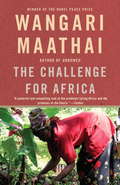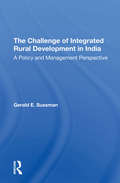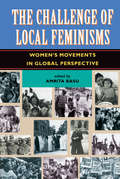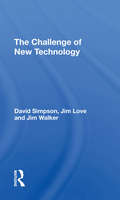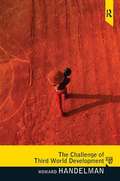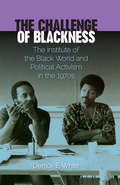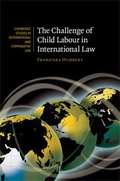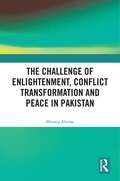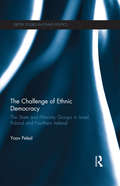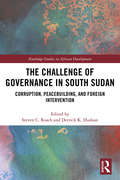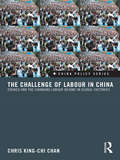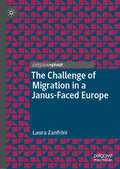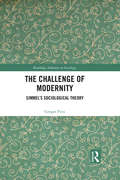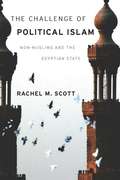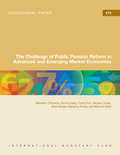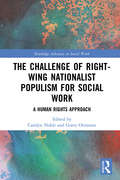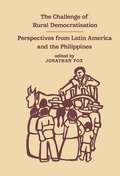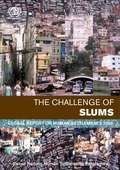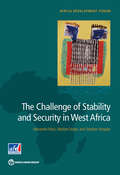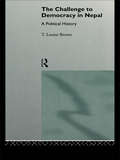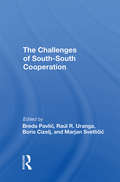- Table View
- List View
The Challenge For Africa
by Wangari MaathaiWangari Maathai,Nobel Peace Prize laureate and founder of the Green Belt Movement, offers a refreshingly unique perspective on the challenges facing Africa, even as she calls for a moral revolution among Africans themselves, who, she argues, are culturally deracinated, adrift between worlds. The troubles of Africa today are severe and wide-ranging. Yet what we see of them in the media, more often than not, are tableaux vivantes connoting poverty, dependence, and desperation. Wangari Maathai presents a different vision, informed by her three decades as an environmental activist and campaigner for democracy. She illuminates the complex and dynamic nature of the continent, and offers “hardheaded hope” and “realistic options” for change and improvement. With clarity of expression, Maathai analyzes the most egregious “bottlenecks to development in Africa,” occurring at the international, national, and individual levels–cultural upheaval and enduring poverty among them–and deftly describes what Africans can and need to do for themselves, stressing all the while responsibility and accountability. Impassioned and empathetic,The Challenge for Africais a book of immense importance. From the Hardcover edition.
The Challenge Of Epistemology
by Joao de Pina-Cabral Christina TorenEpistemology poses particular problems for anthropologists whose task it is to understand manifold ways of being human. Through their work, anthropologists often encounter people whose ideas concerning the nature and foundations of knowledge are at odds with their own. Going right to the heart of anthropological theory and method, this volume discusses issues that have vexed practicing anthropologists for a long time. The authors are by no means in agreement with one another as to where the answers might lie. Some are primarily concerned with the clarity and theoretical utility of analytical categories across disciplines; others are more inclined to push ethnographic analysis to its limits in an effort to demonstrate what kind of sense it can make. All are aware of the much-wanted differences that good ethnography can make in explaining the human sciences and philosophy. The contributors show a continued commitment to ethnography as a profoundly radical intellectual endeavor that goes to the very roots of inquiry into what it is to be human, and, to anthropology as a comparative project that should be central to any attempt to understand who we are.
The Challenge Of Integrated Rural Development In India: A Policy And Management Perspective
by Gerald E SussmanIn 1952, India launched a massive and enthusiastic effort to reach the 360 million people in its 550,000 villages with a national program of economic and social reconstruction. Known as Community Development, the program provided an innovative model of rural development for both Third World nations and the aid-giving countries of the West. Although the program achieved its goal of providing service coverage to the nation, its many implementation problems and the lack of quantifiable cost-effectiveness led critics to label it a failure and resulted in its submergence into the Ministry of Food and Agriculture in 1966. More recently, however, partly as a result of the social dislocations following the "Green Revolution," there has been renewed interest in Community Development as the Indian government searches for ways of effectively implementing a strategy of integrated rural development. It is recognized that a repeat of the CD program is not the answer; but an analysis of the program allows the identification of the elements critical to good administration—and political survival. Drawing on extensive interviews with Indian and American participants, this book critically appraises the Community Development program. Dr. Sussman examines the successful pilot project at Etawah, then documents the many problems—organizational, political, and logistical—that were encountered in the attempt to replicate it on a nationwide scale, and that eventually led to its demise. From his analysis emerges the question of what kind of government strategies can best equip rural populations to participate in development. Admitting the difficulties still to be faced, he concludes on a note of guarded optimism based on recent efforts in both India and the U.S. that combine a systems approach with the use of a range of development strategies.
The Challenge Of Local Feminisms: Women's Movements In Global Perspective
by Amrita BasuThis pathbreaking book provides for the first time an overview of the genesis, growth, gains, and dilemmas of women's movements worldwide. Unlike most of the literature, which focuses on the industrialized Western world, this volume devotes greater attention to the postcolonial states of Asia, Africa, and Latin America. The book challenges the assumptions that feminism can transcend national differences and, conversely, that women's movements are shaped and circumscribed by national levels of development. All the authors reject the notion, proposed by its detractors and champions alike, that feminism is of middle-class origins and Western inspiration. Instead they seek to locate women's movements within the terrain from which they emerge.Virtually all the authors are from the countries or communities about which they write the few exceptions are women who have spent lengthy periods studying and living in the region. Most are scholars, often in women's studies, and many are closely associated with the movements they describe. Thus, these writers share a commitment to the substantive concerns as well as the collective processes of women's movements. As a key book for the Fourth World Conference on Women in Beijing, this volume will be essential reading for anyone interested in the global scope and implications of feminism.
The Challenge Of New Technology
by Jim Walker David Simpson Jim LoveThis book looks at what has actually happened when new technology has been deployed in an industrial and commercial environment. It considers the economic impact of new technology on three groups of organisations: firms, governments and trade unions.
The Challenge Of Third World Development (Seventh Edition)
by Howard HandelmanUpdated in its 7th edition, The Challenge of Third World Development examines political, economic, and social change in countries in Africa, Asia, Latin America, and the Middle East. Exploring common issues and problems in these regions, this text helps readers grasp the structural dynamics and human stories behind development. Accessibly written for readers of any social science background, The Challenge of Third World Development immerses readers in issues like democratization, global warming, and women's changing roles and encourages them to understand what drives these issues at an individual, national, and global level.
The Challenge of Blackness
by Lerone BennettIn "The Challenge of Blackness", Bennett critically examines what it means to be black in America now and in the past. He also looks at the attitudes expressed towards Blacks in the media and as an artist, as well as the attitudes of Blacks towards Blacks and Whites on Blacks. A thought-provoking books by one of America's most prolific and renowned writers.
The Challenge of Blackness: The Institute of the Black World and Political Activism in the 1970s (Southern Dissent)
by Derrick E. WhiteThe Challenge of Blackness examines the history and legacy of the Institute of the Black World (IBW), one of the most important Black Freedom Struggle organizations to emerge in the aftermath of the assassination of Dr. Martin Luther King Jr.A think tank based in Atlanta, the IBW sought to answer King's question "Where do we go from here?" Its solution was to organize a broad array of leading Black activists, scholars, and intellectuals to find ways to combine the emerging academic discipline of Black Studies with the Black political agenda.Throughout the 1970s, debates over race and class in the Unites States grew increasingly hostile, and the IBW's approach was ultimately unable to challenge the growing conservatism. By using the IBW as the lens through which to view these turbulent years, Derrick White provides an exciting new interpretation of the immediate post-civil rights years in America.
The Challenge of Child Labour in International Law
by Franziska HumbertChild labour remains a widespread problem around the world. Over 200 million children can be regarded as child labourers, and about 10 million children are involved in producing either agricultural or manufactured products for export. Franziska Humbert explores the status of child labour in international law. Offering a wide-ranging analysis of the problem, she explores the various UN and ILO instruments and reveals the weaknesses of the current frameworks installed by these bodies to protect children from economic exploitation. After assessing to what extent trade measures such as conditionalities, labelling and trade restrictions and promotional activities can reduce child labour, she suggests an alternative legal framework which takes into account the needs of children.
The Challenge of Crime: Rethinking Our Response
by Henry RuthThe development of crime policy in the United States for many generations has been hampered by a drastic shortage of knowledge and data, an excess of partisanship and instinctual responses, and a one-way tendency to expand the criminal justice system. Even if a three-decade pattern of prison growth came to a full stop in the early 2000s, the current decade will be by far the most punitive in U.S. history, hitting some minority communities particularly hard. The book examines the history, scope, and effects of the revolution in America's response to crime since 1970. Henry Ruth and Kevin Reitz offer a comprehensive, long-term, pragmatic approach to increase public understanding of and find improvements in the nation's response to crime. Concentrating on meaningful areas for change in policing, sentencing, guns, drugs, and juvenile crime, they discuss such topics as new priorities for the use of incarceration; aggressive policing; the war on drugs; the need to switch the gun control debate to a focus on crime gun regulation; a new focus on offenders' transition from confinement to freedom; and the role of private enterprise. A book that rejects traditional liberal and conservative outlooks, The Challenge of Crime takes a major step in offering new approaches for the nation's responses to crime.
The Challenge of Enlightenment, Conflict Transformation and Peace in Pakistan
by Moonis AhmarThis book looks at the process of cultural enlightenment in the context of Pakistan. It undertakes an interesting and in-depth research focusing on how the world’s second largest Muslim state can learn from Europe’s heritage of enlightenment. It studies why Pakistan lacks a process of awakening and what the scope of cultural enlightenment in Pakistan is against the backdrop of militant Islam. The author argues that cultural enlightenment can help promote positive conflict transformation in Pakistan and discusses the ways in which challenges to establishing a culture of reasoning, tolerance, accommodation, social justice and peace can be dealt with. A unique contribution, this book will be of interest to students and researchers of philosophy, political science, history, international relations, South Asian studies and religious studies. It will also appeal to think tanks, policymakers and general readers interested in these topics.
The Challenge of Ethnic Democracy: The State and Minority Groups in Israel, Poland and Northern Ireland (Exeter Studies in Ethno Politics)
by Yoav PeledEthnic democracy is a form of democratic ethnic conflict regulation in deeply divided societies. In The Challenge of Ethnic Democracy, Yoav Peled argues that ethnic democracy is constituted by the combination of two contradictory constitutional principles: liberal democracy and ethno-nationalism, and that its stability depends on the existence of a third, mediating constitutional principle of whatever kind. This central argument is supported by an analysis of the history of three ethnic democracies; Northern Ireland under Unionist rule, where ethnic democracy was stable for almost 50 years (1921-1969), then collapsed; The Second Polish republic (1918-1939), where ethnic democracy was written into the constitution but was never actualised; and Israel within its pre-1967 borders, where ethnic democracy was stable for 35 years (1966-2000) but may now be eroding. This book examines the different trajectories of the case studies, demonstrating that Poland lacked a third, mediating constitutional principle, while Israel and Northern Ireland did have such a principle – civic republicanism in Israel, and populism in Northern Ireland. The collapse of ethnic democracy in Northern Ireland resulted from the weakening of populism, that depended on British monetary subsidies for its implementation, whilst the erosion of ethnic democracy in Israel resulted from the decline of civic republicanism since the onset of economic liberalization in 1985. Dealing with ethnic democracy in a comparative framework, this book will appeal to students, scholars and researchers of Sociology, Political Science and Middle East Studies.
The Challenge of Governance in South Sudan: Corruption, Peacebuilding, and Foreign Intervention (Routledge Studies in African Development)
by Steven C Roach Derrick K HudsonSouth Sudan is one of the world’s most divided and unstable countries. Since achieving statehood in 2011, the country has plunged into civil war (2013-15) and become the scene of some of the worst human rights abuses on the African continent. Despite ongoing political turmoil, states and international institutions have pledged enormous resources to stabilize the country and shore up the current peace process, but have had limited influence in dealing with the effects of rampant corruption and factionalism. The Challenge of Governance in South Sudan examines the factors that continue to haunt peace-building efforts, including the domination of the SPLM/A, factionalization, corruption, human rights atrocities, an ineffective constitution, and the role of international actors. It brings together a diverse set of leading scholars to reflect on these factors and propose ways of promoting peace and stability in South Sudan. In particular, the book asks whether the disparity between domestic priorities/policies and foreign intervention strategies has prevented the peace process from moving forward. The contributors probe this issue by addressing the flaws of past peace agreements, poor governance, a weakly articulated peacekeeping mission, US foreign policy, and a lack of moral accountability. This book is perfect for students, scholars and policy makers with an interest in the challenges faced by the world’s newest country.
The Challenge of Labour in China: Strikes and the Changing Labour Regime in Global Factories (China Policy Series)
by Chris King-chi ChanChina’s economic success has been founded partly on relatively cheap labour, especially in the export industries. In recent years, however, there has been growing concern about wages and labour standards in China. This book examines how wages are bargained, fought over and determined in China, by exploring how the pattern of labour conflict has changed over time since the 1970s. It focuses in particular on the city of Shenzhen where labour conflict and workers’ protests have been especially prevalent. This book includes a detailed account of the transformation of labour relations and labour policy in China more broadly during 2004 to 2009, a period when there have been significant changes in the labour market, labour regulation and labour relations. The author argues that these recent developments have brought to the fore the class basis of workers’ protest in China and have thoroughly undermined the post-Marxist analysis of identity politics. The book makes an invaluable contribution to studies on industry and labour, as well as Chinese studies.
The Challenge of Migration in a Janus-Faced Europe
by Laura ZanfriniThis book critically investigates the origins and consequences of the Janus-faced character of attitudes and policies towards migrants that seek to penetrate “Fortress Europe”. Beginning with an examination of its founding ambitions, it locates the roots of an ingrained ambivalence in the legacies of the post-war period and the unresolved tension between the economicism of the European approach to labour migration and the philosophy of rights and solidarity embedded in the EU project. It highlights how the formalization of citizenship rights has produced both formal pathways towards inclusion for migrants and, in their selective eligibility criteria, exclusive systems of civic stratification. The author links this oscillation between positions of closure and openness to the paradoxical trade-offs in migration policies, in particular labour market integration, demonstrated through unequal labour market outcomes, lower social mobility and educational attainments. The issues faced by migrants’ offspring in Europe are examined as paradigmatic of the struggle to balance competing calls for both pluralism and uniformity: to create a diverse society that can also project a homogenous collective identity. This balanced overview will provide an invaluable resource for students of migration studies, European politics, public policy, international relations and the sociology of racism.
The Challenge of Modernity: Simmel’s Sociological Theory (Routledge Advances in Sociology)
by Gregor FitziThe complete collected works of Georg Simmel are now available. Yet, the standing of Simmel’s sociological theory is still a subject of controversy. Is Simmel only a brilliant impressionist, a flâneur in the territories of modernity? Providing an illuminating and coherent presentation of Simmel’s sociological theory, The Challenge of Modernity seeks to demonstrate how Simmel contributed a structured sociological theory that fits the criteria of a ‘sociological grand theory’. Indeed, starting by the theory of modernity and its dimensions of social differentiation, monetarisation, culture reification and urbanisation; it reconstructs the architecture of Simmel’s sociological epistemology. Particular attention is dedicated to the theory of ‘qualitative societal differentiation’ that Simmel develops within his cultural sociology, with the late work being presented as a double contribution to the foundation of sociological anthropology and to the social ethics of complex societies. Presenting the entirety of Simmel’s manifold oeuvre from the viewpoint of its relevance for sociology, this comprehensive volume will appeal to scholars and advanced students who wish to understand Simmel’s relevance for socio-political thought and become acquainted with his contribution to sociological theory. It will also be of interest to the wider public who seek a critical assessment of our age in theoretical terms.
The Challenge of Political Islam
by Rachel ScottThe rise of political Islam has provoked considerable debate about the compatibility of democracy, tolerance, and pluralism with the Islamist position. AsThe Challenge of Political Islamreveals, Egyptian Islamists today are more integrated into the political arena than ever, and are voicing a broad spectrum of positions, including a vision of Islamic citizenship more inclusive of non-Muslims. Based on Islamist writings, political tracts, and interviews with Islamists-including members of Egypt's Muslim Brotherhood and other important contemporary thinkers-this book looks closely at how modern, politically-oriented Egyptian Islamists perceive non-Muslims in an Islamic state and how non-Muslims respond. Clarifying the movement's aims, this work uncovers how Islamists have responded to the pressures of modernity, the degree to which the movement has been influenced by both a historical Islamic framework and Western modes of political thinking, and the necessity to reconsider the notion that secularism is a precondition for toleration.
The Challenge of Public Pension Reform in Advanced and Emerging Market Economies
by Sanjeev Gupta Benedict Clements David Coady Alvar Kangur Frank Eich Baoping Shang Mauricio SotoA report from the International Monetary Fund.
The Challenge of Right-wing Nationalist Populism for Social Work: A Human Rights Approach (Routledge Advances in Social Work)
by Carolyn NobleRight-wing nationalist populism poses direct attacks on social tolerance, human rights discourse, political debates, the survival of the welfare state and its universal services, impacting on the roles of social work. This book demonstrates how right-wing nationalist populism can and must be countered. Using case studies from around the world, this book shows how a revitalised radical social work where community organisation, building alliances, trade union commitment and social action can be used as political forces to speak up against discrimination and hate in accordance with human rights, social justice, and social work values. The rise of national populism signals that now is the time for social work to forge and reforge such networks and create links with civil society and challenge right-wing populist policies wherever they manifest themselves. It will be of interest to all social work students, practitioners and academics, particularly those working on critical and radical social work, green social work, anti-oppressive practice and community development.
The Challenge of Rural Democratisation: Perspectives from Latin America
by Jonathan FoxFirst published in 1990. Routledge is an imprint of Taylor & Francis, an informa company.
The Challenge of Slums: Global Report on Human Settlements
by United Nations Human Settlements ProgrammeThe Challenge of Slums presents the first global assessment of slums, emphasizing their problems and prospects.
The Challenge of Stability and Security in West Africa
by Alexandre Marc Neelam Verjee Stephen MogakaSince independence, the West African subregion has been an arena for a number of large-scale confl icts and civil wars, as well as simmering and low-intensity uprisings. Contrary to perceptions, West Africa in its postindependence history has experienced fewer conflict events and fatalities from conflict than the other subregions on the continent. The turn of the millennium has witnessed the recession of large-scale and conventional conflict, and it has ushered in new and emerging threats. The specters of religious extremism, maritime piracy, and narcotics trafficking threaten to undermine some of the progress achieved in recent years. The Challenge of Stability and Security in West Africa critically examines the key drivers of conflict and violence, and the way in which they impact the countries of the subregion. In addition to emerging threats, these drivers include the challenges of youth inclusion, migration, subregional imbalances, and extractives, as well as challenges related to the fragility of political institutions and managing the competition for power, reform of the security sector, and weakness of institutions related to land management. The book explores how the subregion, under the auspices of the regional organization ECOWAS, has become a pioneer on the continent in terms of addressing regional challenges. The Challenge of Stability and Security in West Africa also identifies key lessons in the dynamics of resilience in the face of political violence and civil war drawn from Côte d'Ivoire, Liberia, and Sierra Leone, that can be useful for countries around the world in similar situations. It incorporates knowledge and findings from leading experts and provides insights from academics and development practitioners. Finally, the book identifies possible policy and programmatic responses and directions for policy dialogue at the national and international levels.
The Challenge of Working for Americans
by Bond BentonThe global focus of corporations, government institutions, and NGOs have led to a defining question of the era: How do foreigners feel about working for Americans? Through surveys with over 700 Foreign Service nationals working within the US State Department, Benton examines perceptions of non-Americans working in overtly American environments.
The Challenge to Democracy in Nepal: A Political History (Politics in Asia)
by T. Louise BrownIn 1990 Nepal's Peoples Movement reduced King Birendra from an absolute ruler to a constitutional monarch. This book is the first academic analysis of these events and places the 'revolution' of 1990 within the context of Nepali history.Louise Brown examines the background to Nepal's recent upheavals as well as covering the country's ealy history and its continuing problems of national integration. The previous, unsuccessful, democratic experiment and the nature of monarchical rule are discussed within an analysis of Nepal's social and economic modernisation. The evolution of political parties, Nepal's foreign relations and development issues - and the way in which these have moulded the political system - are explored in depth.Drawing on extensive interviews with leading politicians and influential figures the author provides a comprehensive survey of the Himalayan Kingdom's political development. This is an original contribution to the debate on democratization in the developing world.
The Challenges Of South-south Cooperation
by Marjan Svetlicic Breda Pavlic Raul R Uranga Boris CizeljThe process of economi c coopera t i on among devel oping countrie s ha s come a l ong way s i nce the ea rl y 1960s . A l ong s i de the movement f rom the e s tab l i s hment of reg i onal and subreg i on a l i n tegration and cooperati on g rou p i ngs to the e l aborati on of concepts and a pproaches for g l obal and i nterreg i onal coopera t i on ( such a s , for exampl e , the scheme for a gl oba l sys tem of trade preferences a mong deve l o p ing countries ) , there has b een a n exten s ion of the scope of coopera t i on , ori g ina l l y focused on trade , to other a rea s , i ncl u d ing moneta ry a n d f i nan c i a l ma tters , produ c t ion , ma rketing , and s o on . Today , the proce s s of economic cooperation among deve l o p ing countri es occu p i e s an i mportan t pl ace i n the economi c s t rategies a n d pol ic ies of devel o p i n g countrie s and , in recent years , wit h the marked deteri o ration in the wo rl d economi c s i tu a t io n and the wea ken i ng of i n ternat i onal cooperati on for deve l opmen t , it has acqu ired even grea ter importa nce and u rgency . I n deed , i n v iew of the pro s pects for the worl d economy for th e comi n g yea rs , i t h a s b ecome an i mpera t i ve i f the devel oping cou n t ries a re going to b e abl e to env i sage the transformation of their economies and the g rowth ra tes th ey need .
